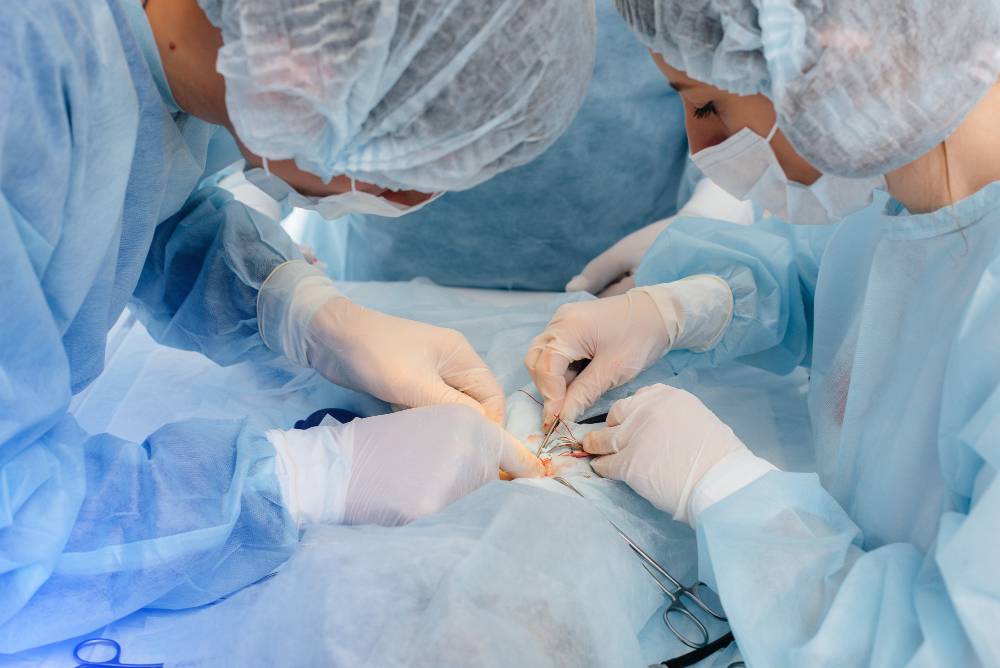Menu

Bunion surgery, or bunionectomy, is an invasive surgical procedure that corrects the deformity of the big toe, alleviating pain and discomfort. The professionals at Mid Penn Foot & Ankle Specialists can recommend the procedure to realign bones, ligaments, tendons, and nerves, restoring proper foot function and relieving pain. If you suspect a problem with your foot, it might be time to consult a professional podiatrist for diagnosis and treatment. Let’s look at what happens during bunion surgery.

Before proceeding with bunion surgery, the foot specialist conducts a comprehensive assessment. This initial evaluation includes a detailed medical history review, physical examination, and diagnostic imaging, such as X-rays. The information gathered provides foot specialists with insight to determine the bunion’s severity, assess your overall health, and identify any potential risks or complications associated with the surgery. This assessment is crucial for developing a personalized surgical plan tailored to your needs and circumstances.
Once the preoperative assessment is complete and the foot doctor establishes a surgical plan, you are prepared for anesthesia. Bunion surgery is usually performed under local anesthesia with sedation or general anesthesia, depending on your preference, medical history, and the physician’s recommendation. Local anesthesia numbs the surgical area, while sedation helps the patient relax during the procedure. With general anesthesia, patients experience temporary unconsciousness, ensuring they are unaware and pain-free throughout the surgery.
After administering anesthesia, the foot doctor begins the surgical procedure by making an incision near the affected big toe. The location and size of the incision may vary depending on the specific technique for bunion correction. Common incision sites include the top or side of the foot, which provides physicians access to the bunion and allows them to manipulate the underlying structures. Professionals leverage specialized surgical instruments to dissect soft tissues, expose the bone, and realign damaged areas during the procedure.
We are committed to providing personalized, compassionate care for everyone who walks through our doors. If you’re ready to schedule an appointment with one of our doctors, give us a call or visit one of our locations today.
BOOK AN APPOINTMENTThe next step after making an incision to access the bunion is bone realignment and tissue repair. The podiatrist will cut and reposition the misaligned bones of the big toe to correct the deformity. Depending on the severity of the bunion, osteotomy techniques can remove excess bone or reshape the joint. In addition, advanced fixation methods such as screws, wires, or plates secure the bones in their new position.
Following bone realignment and tissue repair, foot specialists will close the incision site using surgical sutures or staples. Attention to detail is critical to achieve optimal wound alignment and minimize tension to promote proper healing and reduce the risk of complications. Once the incision is closed, a sterile dressing protects the surgical site and absorbs any drainage. Postoperative foot care instructions, including pain management techniques, activity restrictions, and follow-up appointments to ensure a smooth recovery process.
Bunion surgery is a complex procedure that involves several vital steps to correct the deformity of the big toe and ease discomfort. Understanding the intricacies of each step is essential if you are considering bunion surgery as it prepares you for what’s ahead. Contact us at Mid Penn Foot & Ankle Specialists and schedule a consultation with our experts to enjoy access to tailored foot care and treatment services.
From the moment we step out of bed in the morning to the last stroll around the house…
Read MorePregnancy is an incredible journey, but let’s be real: it’s also tough on your body. From morning sickness…
Read MoreOur bodies are an intricate network of bones, muscles, tendons, and ligaments working together…
Read More